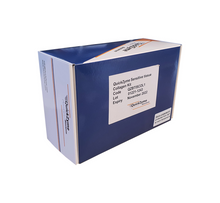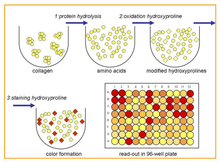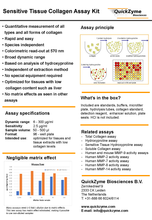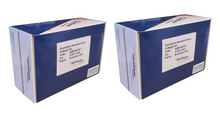
Description
Now collagen can be easily determined in small tissue samples with low collagen levels!
The QuickZyme Sensitive Tissue Collagen Assay kit is based on the quantitative colorimetric determination of hydroxyproline residues, obtained by acid hydrolysis of collagen. The Sensitive Tissue Collagen assay shows no matrix effect and no need for further dilution of the hydrolysate enabling measuring in small samples with low collagen concentrations, such as liver. The assay is simple and it doesn’t need the drying step following acid hydrolysis, resulting in a fast (<2 hrs) and easy (96-well plate format) assay following the hydrolysis step.
Collagen is one of the main components of extracellular matrix. Dysregulation in collagen production results in pathologies such as fibrosis (too much collagen), or osteoarthritis (too little collagen). Therefore measurement of collagen production is important in many disease related studies.
The QuickZyme Sensitive Tissue Collagen assay is based on the detection of hydroxyproline. Hydroxyproline is a non-proteinogenic amino acid, which in mammals occurs mainly in collagen. Hydroxyproline in tissue hydrolysates can be used as a direct measure of the amount of collagen present in the tissue.
The measurement of collagen is started by complete hydrolysis of tissue samples in 6M HCl at 95°C. In the hydrolysate hydroxyproline residues are quantified using a modification of the method described by Prockop and Udenfriend (Anal. Biochem.,1960, 1: 228-239). The assay measures the total amount of hydroxyproline present in the sample, which represents all the types of collagen present in the sample without discriminating between the types of collagen and between procollagen, mature collagen and collagen degradation products.
In contrast to other hydroxyproline-based assays, the QuickZyme Sensitive Tissue Collagen assay has no matrix effect and no need for dilution of the hydrolysate enabling measuring in small samples with low collagen concentrations. The assay is simple and it doesn’t need the drying step following acid hydrolysis for which often special equipment is needed.
Features
- Quantitative measurement of all types of collagen, species independent.
- Samples: tissue homogenates, tissues.
- Colorimetric measurement
- Optimized for tissues with low collagen content such as liver
- No matrix effects as seen in other assays
- Range: 6 to 300 μg/ml. Sensitivity: 2.5 µg/ml
- Uses rat tail collagen as standard
- Ease-of-use: Equivalent to ELISA
- Store at room temperature
Type
Colorimetric Assay

Applications
- Tissue, Tissue homogenates
Sensitivity
2.5 µg/ml
Quantitative Measurement
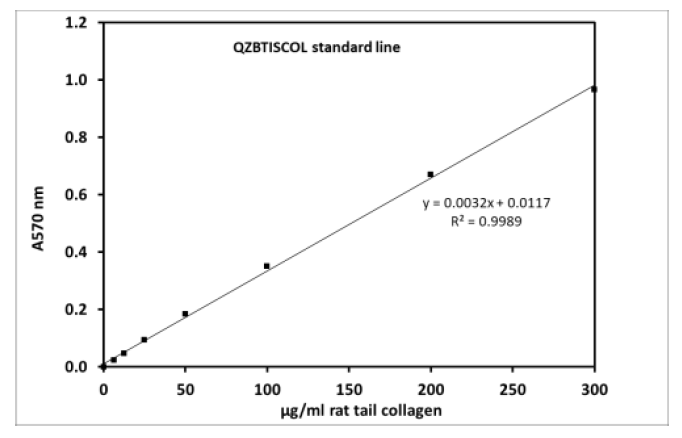
Negligible Matrix Effect

Many assays need (>5 fold ) dilution due to matrix effects. This new assay has matrix effect eliminated, making it possible to use non-diluted samples.
Storage
Unopened kit: Store at room temperature (RT) in the dark. Do not use kit components past kit expiration date.
Opened kit / reconstituted reagents: The opened collagen standard, assay buffer and enhancer solution should be stored light protected at 4°C. The other opened reagents should be stored light protected at RT and are stable for at least 1 month. The reconstituted detection reagent (A+B) should be used on the day of reconstitution.
Other Names/Synonyms
hydroxyproline residues
Documents
- Product Datasheet (PDS)
- Frequently Asked Questions (FAQ)
- Application note 1: How to choose your collagen assay?
- Application note 2: How to measure collagen in mouse tissues?
- Application note 3: Collagen per protein analysis in fresh, frozen and formalin-fixed tissues
Product References
- Gart, Eveline et al. “Translational characterization of the temporal dynamics of metabolic dysfunctions in liver, adipose tissue and the gut during diet-induced NASH development in Ldlr-/-.Leiden mice.” Heliyon vol. 9,3 e13985. 24 Feb. 2023, doi:10.1016/j.heliyon.2023.e13985
- Upchurch, Clint M et al. “Targeting oxidized phospholipids by AAV-based gene therapy in mice with established hepatic steatosis prevents progression to fibrosis.” Science advances vol. 8,28 (2022): eabn0050. doi:10.1126/sciadv.abn0050
- Seidel, Florine et al. “Therapeutic Intervention with Anti-Complement Component 5 Antibody Does Not Reduce NASH but Does Attenuate Atherosclerosis and MIF Concentrations in Ldlr-/-.Leiden Mice.” International journal of molecular sciences vol. 23,18 10736. 14 Sep. 2022, doi:10.3390/ijms231810736
- Gart, Eveline et al. “Butyrate Protects against Diet-Induced NASH and Liver Fibrosis and Suppresses Specific Non-Canonical TGF-β Signaling Pathways in Human Hepatic Stellate Cells.” Biomedicines vol. 9,12 1954. 20 Dec. 2021, doi:10.3390/biomedicines9121954
- Sakai, Takahiro et al. “Effects of the Cytoplasm and Mitochondrial Specific Hydroxyl Radical Scavengers TA293 and mitoTA293 in Bleomycin-Induced Pulmonary Fibrosis Model Mice.” Antioxidants (Basel, Switzerland) vol. 10,9 1398. 31 Aug. 2021, doi:10.3390/antiox10091398
- van den Hoek, Anita M et al. “Beneficial effects of elafibranor on NASH in E3L.CETP mice and differences between mice and men.” Scientific reports vol. 11,1 5050. 3 Mar. 2021, doi:10.1038/s41598-021-83974-8
- van den Hoek, Anita M et al. “A Translational Mouse Model for NASH with Advanced Fibrosis and Atherosclerosis Expressing Key Pathways of Human Pathology.” Cells vol. 9,9 2014. 1 Sep. 2020, doi:10.3390/cells9092014
- Mayeux, Jessica M et al. “Development of experimental silicosis in inbred and outbred mice depends on instillation volume.” Scientific reports vol. 9,1 14190. 2 Oct. 2019, doi:10.1038/s41598-019-50725-9
- Ulmasov, Barbara et al. “An Inhibitor of Arginine-Glycine-Aspartate-Binding Integrins Reverses Fibrosis in a Mouse Model of Nonalcoholic Steatohepatitis.” Hepatology communications vol. 3,2 246-261. 27 Dec. 2018, doi:10.1002/hep4.1298
Related Products
Ilex Life Sciences LLC is an official distributor of QuickZyme Biosciences.





